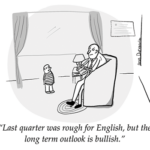Actor Michael Keaton, left, Boston Globe editor Walter Robinson, right
The Boston Globe’s Walter Robinson gave an inspiring if cautionary talk to a room full of journalists last week. His remarks were so engrossing that, as the Seattle Times’ Paige Cornwell noted, Robinson got a room full of reporters to ignore an open bar. (Well, ahem, most of them. The following account is cobbled together from reporters who were in attendance, Twitter, and helpful folks on the EWA email list. Quotes should probably be considered paraphrases. A recording of the event is linked at the bottom.)
In a talk interspersed with clips from the movie Spotlight (in which he’s played by Michael Keaton), Robinson described how meaningful it was to be a journalist but at the same time how easy it was to get distracted and “give a pass” to institutions that were too close to home or too important to examine.;”Doing good journalism is a life worth living,” said Robinson, but he and many other journalists “were too deferential to the (Catholic) church.”
It’s a remark that makes you wonder about the education beat. There’s an obvious affinity between education reporters and educators. Both groups of individuals find schools interesting and important. No small number of reporters end up working in the education system. So, consciously or otherwise, are education reporters giving a pass to those who are in charge of the $600 billion per year education system that’s responsible for educating American children? Are we letting the system protect itself in ways that might, years later, look obvious?
While I can’t think of any examples as obvious as the Globe missing scores of predatory priests in their own backyard, I think it’s an issue that’s worth pondering.
Robinson also bore down on the topic of how editors and journalists spend their valuable time. “The best stories do not come to you; you have to go to them,” he said. “The more we do of the dailies and the press conferences, the less we can do of the good, investigative work” His comments couldn’t have come at a better moment. Just a little while before, EWA had released a survey of education reporters from around the country that revealed that while jobs are steady if not actually rising, and there’s been a proliferation of foundation-funded journalism in the past few years, press releases and PR story pitches were the most common place to get story ideas.
He also asserted that news outlets are losing readers largely because “we aren’t investing in content people care about” rather than lack of resources, etc. Good news organizations should focus on stories that people can’t get elsewhere. The wrongs that have plagued journalism don’t stem from a lack of resources but from a lack of will.
You can hear most of the speech here, thanks to Alabama School Connection’s Trisha Powell Crain. Thanks also to Samantha Hernandez, who tweeted many of Robinson’s remarks and shared her video as well.
ABOUT THE AUTHOR

Alexander Russo
Alexander Russo is founder and editor of The Grade, an award-winning effort to help improve media coverage of education issues. He’s also a Spencer Education Journalism Fellowship winner and a book author. You can reach him at @alexanderrusso.
Visit their website at: https://the-grade.org/


![Make [Education] Reporting Great Again](https://kappanonline.org/wp-content/uploads/2024/03/make-education-reporting-great-again-2016-440x264.jpg)








